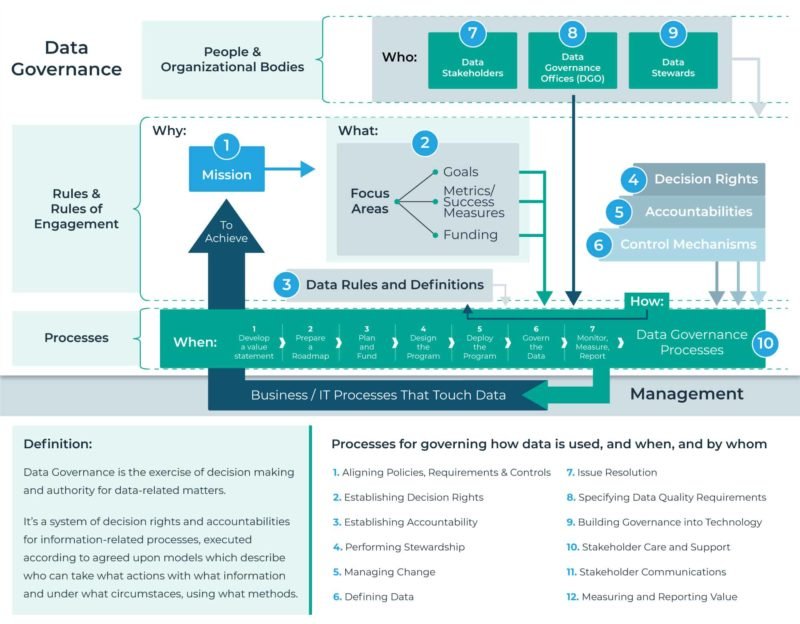This post is sponsored by Diamond Links and may contain affiliate links.
It’s good for organizations to plan how they use data so that it’s handled consistently throughout the business, to support business outcomes. Organizations who successfully do this usually consider the who, what, how, when, where and why of data to not only ensure security and compliance, but to extract value from all the information collected and stored across the business – improving business performance.
What is Data governance?
Data governance is a set of principles and practices that ensure high quality through the complete lifecycle of your data. According to the Data Governance Institute (DGI), it is a practical and actionable framework to help a variety of data stakeholders across any organization identify and meet their information needs.
A well-managed data governance framework will underpin the business transformation toward operating on a digital platform at many levels within an organization:
- Management: For top-management this will ensure the oversight of corporate data assets, their value and their impact in the changing business operations and market opportunities
- Finance: For finance this will safeguard consistent and accurate reporting
- Sales: For sales and marketing this will enable trustworthy insight into customer preferences and behavior
- Procurement: For procurement and supply chain management this will fortify cost reduction and operational efficiency initiatives based on exploiting data and business ecosystem collaboration
- Production: For production this will be essential in deploying automation
- Legal: For legal and compliance this will be the only way to meet increasing regulation requirements
The Data Governance Framework
A data governance framework is a set of data rules, organizational role delegations and processes aimed at bringing everyone on the organization on the same page. There are many data governance frameworks out there. For example: they will use the one from The Data Governance Institute. This framework has 10 components. See below for more details.
Why Bother?
Data is becoming the core corporate asset that will determine the success of your business. Digital transformation is on the agenda everywhere. You can only exploit your data assets and do a successful digital transformation if you are able to govern your data. This means that it is an imperative to deploy a data governance framework that fits your organization and your future business objectives and business models. That framework must control the data standards needed for this journey and delegate the required roles and responsibilities within your organization and in relation to the business ecosystem where your company operates.
Benefits
You may notice that the benefits are probably obvious. Data governance means better, leaner, cleaner data, which means better analytics, which means better business decisions, which means better business results. Better market positioning. Mindshare in your space. Reputation. Better profit margin. (Something everyone likes)
Data Protection and Data Privacy
The increasing awareness around data protection and data privacy has a strong impact on data governance. Terms as data protection by default and data privacy by default must be baked into their data policies and data standards not at least when dealing with data domains as employee data, customer data, vendor data and other party master data.
As a data controller you must have the full oversight over where your data is stored, who is updating the data and who is accessing the data for what purposes. You have to know when you handle personal identifiable information and do that for the legitimate purposes in the given geography both in production environments and in test and development environments.
Best Practices
You can learn a lot from others who have been on a data governance journey. Every organization is different, and you need to adapt the data governance practices all the way starting from the unaware maturity phase to the nirvana in the effective maturity phase.
Hopefully you can now answer the question of what is governance.



Leave a Reply